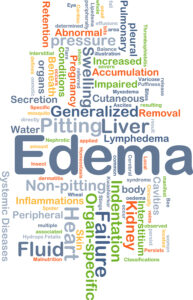What Can Cause Edema in the Elderly?
Edema is a medical term for swelling. In a person it occurs when body parts swell due to injury or illness. Edema happens when small blood vessels leak fluid into nearby tissues, causing them to swell up with an excess of fluid. While it can happen anywhere in the body, it most often occurs in the legs, feet, ankles, hands, and arms.
If you or your home care provider have noticed your elderly parent seems to have some additional swelling occurring in her extremities, look for these symptoms to help you determine if it is edema:
- Skin that retains a dimple or indentation after being pressed for several seconds.

Home Care Bellaire, TX: Seniors and Edema
- Swelling or puffiness of the tissue directly under your parent’s skin, especially in the legs or arms.
- Stretched or shiny skin that feels uncomfortable to your parent.
There are quite a few reasons why someone might develop edema, ranging from short-term environmental factors, to prescription side effects, to health issues that need to be diagnosed and treated. If your parent has some swelling occurring, speak to her and her home care provider to see if the cause is something that can be easily remedied (such as a diet adjustment or rest) or if you need to visit her doctor to determine what the edema is a symptom of.
Mild causes of edema that can be tackled easily are:
- Sitting in one position too long. For example, if a long plane ride or car trip is in your parent’s upcoming schedule, make sure she plans to move around every few hours to increase circulation and reduce the chance of edema developing.
- Eating too much salty food. Salt can cause the body to retain fluids. Make sure your parent is watching her sodium intake, especially in those frozen prepared meals, which can be packed with sodium.
- Allergic Reaction. If your parent encounters something she is allergic to, whether by touching it or ingesting it, she may develop edema in the area affected.
Some medications can also cause edema. If your parent takes any of these medications and starts to develop edema, talk to her doctor about the side effects and what can be done to alleviate or reduce them.
- Certain diabetes medications called thiazolidinediones
- High blood pressure medications
- Nonsteroidal anti-inflammatory drugs
- Steroid drugs
- Estrogens
Some chronic illnesses can also cause edema in the patients that have the illness. If your parent has any of these illnesses, you’ll want to work with her on being proactive about eliminating edema by watching what she eats and making sure she follows her doctor’s advice for exercise and physical activity.
- Congestive Heart Failure. A weakened heart does not pump blood as effectively as it should. This can cause fluid to build up, especially in the legs.
- Liver disease. Severe liver diseases, such as cirrhosis of the liver, may cause your parent to retain fluid.
- Kidney disease. If your parent has nephrotic syndrome, it’s possible for her to develop severe leg edema and possibly even edema over her entire body.
- Inadequate lymphatic system. The lymphatic system clears excess fluid from tissues. If it is damaged by cancer or other surgery, the lymph nodes and vessels draining an area may not work correctly, and edema can occur.
If edema is a new development for your parent, it’s always important to check in with her doctor to determine what the cause of the edema is and the best way to treat it.
If you or an aging loved one are considering Home Care in Bellaire, TX, contact the caring staff at Personal Caregiving Services at 832-564-0338. Providing Care in Houston, Bellaire, West University Place, Katy, and Sugar Land and the surrounding areas.
- Why Maintaining Flexibility Is So Important For Seniors - April 3, 2025
- Home Care Assistance Helps Seniors Manage Medical Appointments - March 19, 2025
- Symptoms and Causes of Edema in the Legs and Feet - March 5, 2025
